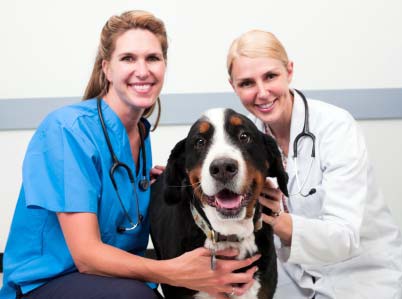
Your Dog’s Weight Gain and Excessive Shedding Might Indicate Hypothyroidism
Hypothyroidism is a clinical condition resulting in inadequate production of thyroid hormones by the thyroid gland. Hypothyroidism is characterized overall by a general decrease in cellular metabolic activity.
Dogs afflicted with hypothyroidism most commonly show weight gain, are lethargic and inactive, have a dull hair coat prone to excessive shedding and areas of hyperpigmentation, and hair loss. They may be prone to recurrent skin infections and chronic ear infections. The clinical signs generally develop slowly and are progressive.
Various systems are affected by the disorder but metabolic and dermatologic abnormalities are most commonly seen.
The condition most often occurs in middle-aged dogs (4 to 10 years) and is more typically seen in medium to large breeds.
Hypothyroidism is best diagnosed through blood work.
Levothyroxine (hormone replacement) is the treatment of choice. Pets treated for canine hypothyroidism have an excellent prognosis and their life expectancy is normal. Although it is not curable, it is a manageable disorder.
Clinical abnormalities (flaky skin, hair loss, lethargy) may take a few weeks to a few months to resolve. Your vet can help answer your questions and see that your hypothyroid dog is being managed correctly.
 What Questions Should Dog Owners Ask Their Vet?
What Questions Should Dog Owners Ask Their Ve
What Questions Should Dog Owners Ask Their Vet?
What Questions Should Dog Owners Ask Their Ve
 How to Care For Emergencies and First Aid
Even the best-cared-for dog may bec
How to Care For Emergencies and First Aid
Even the best-cared-for dog may bec
 The Carefully Planned Litter
Successful breeders know the streng
The Carefully Planned Litter
Successful breeders know the streng
 Dog Cancer: What's Common?
Approximately half of mammary tumor
Dog Cancer: What's Common?
Approximately half of mammary tumor
 Suffocation Hazards for Dogs
Suffocation Hazards for Dogs
Suffocation Hazards for Dogs
Suffocation Hazards for Dogs
Copyright © 2005-2016 Pet Information All Rights Reserved
Contact us: www162date@outlook.com